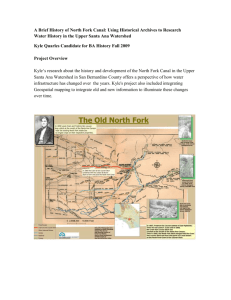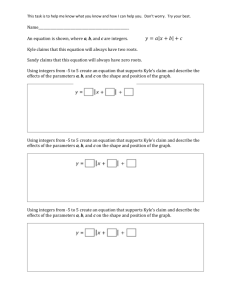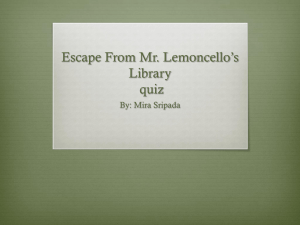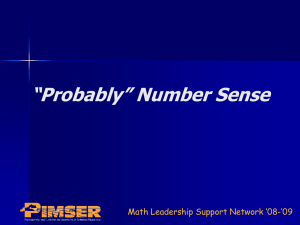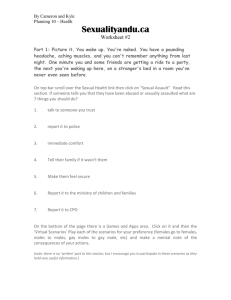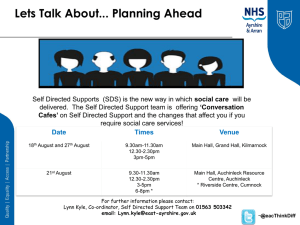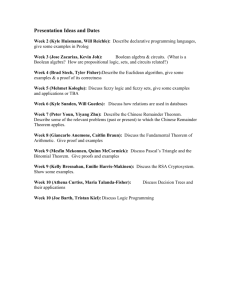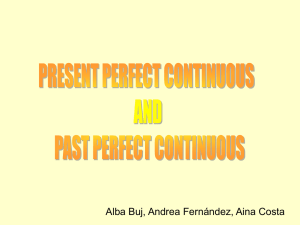Day after day, beauty grenades fall around me,
advertisement
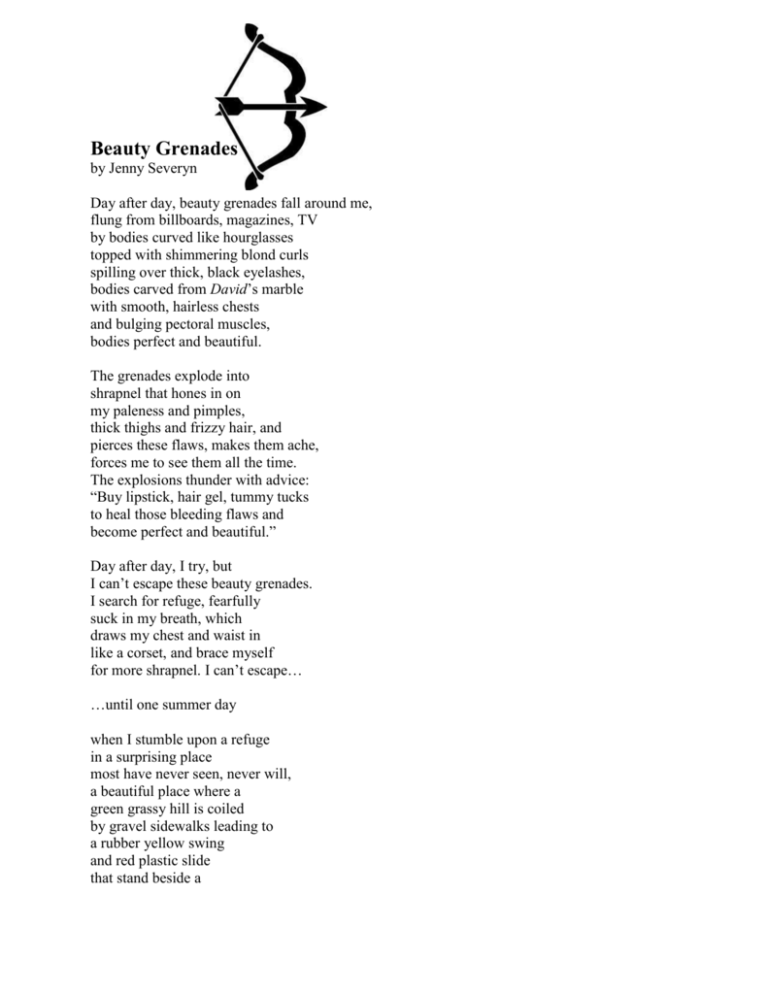
Beauty Grenades by Jenny Severyn Day after day, beauty grenades fall around me, flung from billboards, magazines, TV by bodies curved like hourglasses topped with shimmering blond curls spilling over thick, black eyelashes, bodies carved from David’s marble with smooth, hairless chests and bulging pectoral muscles, bodies perfect and beautiful. The grenades explode into shrapnel that hones in on my paleness and pimples, thick thighs and frizzy hair, and pierces these flaws, makes them ache, forces me to see them all the time. The explosions thunder with advice: “Buy lipstick, hair gel, tummy tucks to heal those bleeding flaws and become perfect and beautiful.” Day after day, I try, but I can’t escape these beauty grenades. I search for refuge, fearfully suck in my breath, which draws my chest and waist in like a corset, and brace myself for more shrapnel. I can’t escape… …until one summer day when I stumble upon a refuge in a surprising place most have never seen, never will, a beautiful place where a green grassy hill is coiled by gravel sidewalks leading to a rubber yellow swing and red plastic slide that stand beside a wood and stone pavilion dotted with picnic tables covered by children’s camp crafts: beige and brown papers splashed with red and blue paint. The craft-makers chase each other through the grass or silently paint at picnic tables or push each other for a turn on the swing. One is a girl with eyes too close together, limbs too short, some words slurred beyond recognition; another is a boy who won’t look me in the eyes, slaps his hands on his thighs, hums and grunts to himself; a third is a girl who moans instead of speaking, with knees that quiver as she walks so she unsteadily sways. I watch these children, sickened to realize that they are the people most harmed by the beauty grenades, yet the grenades never touch them. These kids suffer a fate far worse than my corseted breath and aching flaws. They suffer invisibility. They don’t look like perfect bodies, but there are no grenades exploding around them, no shrapnel attacking their flaws because, the perfect bodies say, these children are so broken they can’t be fixed. They don’t even deserve shrapnel digging into their skin. They don’t even deserve to be looked at. They are made invisible. This summer day, I rally my troop of preteens. I tell them we’re moving to the next activity. The archery range is at the bottom of the hill. One boy needs more help getting there than the rest: Kyle. His thin brown hair covers a dent in his skull, thick glasses cover straining eyes and freckles, chapped lips cover crooked teeth, striped T-shirt covers gauze that covers a feeding tube, cargo shorts cover small legs that hardly move. He is ever fixed in a manual wheelchair and he does not speak. He only grunts, squeals, or coos. To the beautiful bodies, he is irreparably ugly, and, as I seize his wheelchair handles, this thought makes tears sting my eyes. I pity him. I take him down the hill at the back of the pack of kids ambling, dashing, hobbling down the pathway. Kyle looks towards purple flowers bobbing in the breeze playing with little white butterflies, and he says nothing. I don’t know if he sees the purple flowers as I see them. I don’t know if they make him feel calm and happy, as I feel. The archery range is manned by a fellow counselor who puts three sets of bows and arrows against a horizontal wooden post that separates the archers and the targets. My kids settle onto the old wooden benches surrounded by crooked trees that let only some sunshine slip through their old, leafy fingers. I stand with Kyle to the side as the other counselor explains the rules of the archery range, and Kyle blankly looks at the sunlight and dandelions and other kids. At last, the other counselor asks who would like to shoot first, and several hands are thrown into the air. Three at a time, they proudly step forward, prepare the bow, and rhythmically shoot arrows at the ragged red-and-white bulls-eyes. Kyle does not volunteer himself to go. He sits quietly. When it is his turn, I lean down, smile, ask, “Ready to shoot, Kyle?” But I scarcely wait for a reply because there will not be one. I wheel him to the post and pick up a dull-tipped, blue-feathered arrow to plug into the matching blue bow. Kyle sits, playing with his fingers, bending them at funny angles and placidly looking to the trees and giggling kids beside him. “Hold onto the bow,” I suggest. He does not move. I bend down to him, pick up one of his little hands, brush it against the bow. He turns to look at it now and clutches the bowstring, studying it. “All right,” I say. “Three…two…one… Shoot!” We pull back the string and release. Our arrow thwacks the bottom of the target and bounces away into the weeds and grass. Embarrassed, I hunch my shoulders. My restricted breath pulls in all the more. I feel like I cannot escape judgment. I must do better. Yet… suddenly a grin breaks out like dawn on Kyle’s face, slowly appearing, slowly spreading, then brilliantly erupting. He spreads his fingers and claps his palms together. He squeals, he giggles. Pure joy, celebrating a victory when I had only seen a loss. Warmed by the daybreak shining from Kyle’s small body, his crooked teeth, his dented skull, I ready the second dull-tipped, blue-feathered arrow. I stand taller. “Three…two…one… Shoot!” We pull back, we release, and the second arrow misses the big target entirely, crashing uselessly into the brush far behind it. I wince, yet Kyle squeals, claps, beams. Somewhere outside this camp, there are people slinking around with shrapnel poking out of their skin in the form of eye shadow or cologne or designer jeans, people hunched over toilets throwing up their lunch while explosions echo outside their homes saying, “You’re too fat,” people turning against each other, laughing at this person’s wrinkles and that person’s greasy hair. Somewhere outside, there is a war on, and there are bomb-throwers and there are victims. And here I am, preparing a third arrow, shoot, a fourth arrow, shoot, a fifth arrow, shoot, and none hit the target. Yet I don’t think it matters. I have discovered something much better than weapons. Kyle laughs and claps and squeals, and my heart pounds with love. I release my breath at last and sigh and smile. I wonder now if Kyle’s face were painted across every magazine, billboard, and TV ad, that resplendent face mirroring the perfect joy which flowers inside him, would the beauty warfare end? I wonder now if everyone could see Kyle’s grinning, freckled face as I see it now, would they set down their grenades and surrender? Because I know Kyle’s light touches me now that I have chosen to see him. Because I know the beauty warfare has ended for me to the sound of claps and laughter.
